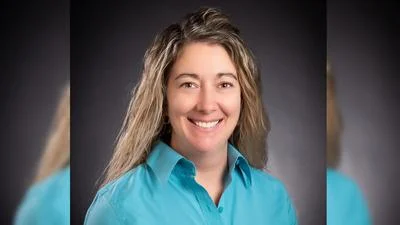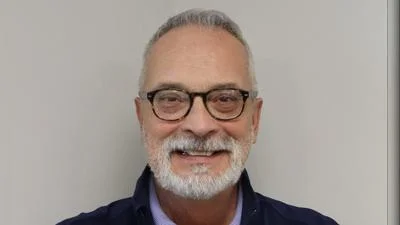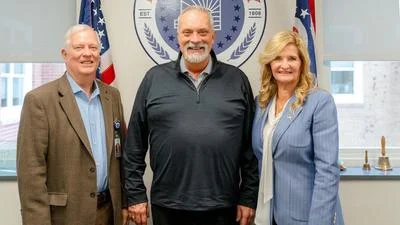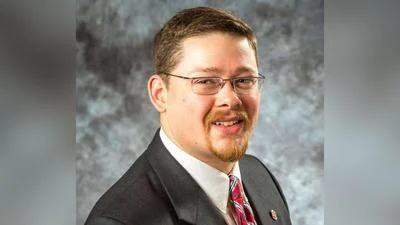Knox Smart Development hosted a town hall meeting at Knox Memorial Theater on Feb. 24.
The town hall, the second of its kind organized by Knox Smart Development, featured journalist Robert Bryce, who has authored six books and recently released a docu-series and documentary on energy rights.
“Environmentalism conservation in America has been replaced by climatism and renewable energy fetishism," he said. "This idea of any solar panels, a good solar panel, any wind turbines, a good wind turbine. Let's put them up everywhere. And those people that don't like it oh those bunch Gomer Pyles out there there just don't know what's good for them. And they want to force it on you. And make no mistake, that is the goal.”
Bryce didn't mince words when he spotlighted what he deemed as questionable alliances and motivations behind the push for solar energy in the region. He recounted an encounter before the town hall in Town Square with Ohio Citizen Action, a group seemingly advocating against fossil fuel influence in energy policies.
Bryce's interaction with the group raised eyebrows as he questioned their funding sources and alleged ties to larger interests. He criticized what he saw as a leftist stance on solar projects, pointing out what he perceived as inconsistencies in their ideology regarding land usage.
“They're 501 C4. They don't reveal their donors,” Bryce said.
The political divide surrounding renewable energy initiatives was also a focal point of Bryce's remarks. He said the divide between areas like Cleveland and Knox County is pervasive.
“What we see now in America, very broadly speaking, is this political, cultural, geographic, and I would say a class divide between urban and rural voters. And let me be clear. Urban voters don't give a crap about you. They just don’t,” he said.
Bryce highlighted the substantial financial stakes involved, citing projections from energy consulting firm Wood Mackenzie, which suggested that solar subsidies could accumulate to a staggering $900 billion by 2060 under current legislation.
“You people stand in the way. Follow the money. Follow the money. It has nothing to do with climate change. Nothing. It's about tax credits,” he said.
Drawing parallels to notorious bank robber Willie Sutton, Bryce suggested that companies like Apex Clean Energy and Open Road Renewables are pursuing solar projects because "that's where the money is," hinting at the lucrative incentives and subsidies driving the renewable energy sector.
“So why are companies like Open Road Renewables, which is based in Austin, Texas, where I live? Why are they pushing solar? That is where the money is,” he said.
Bryce highlighted the growing influence of community opposition against solar projects, shedding light on instances of corruption and the clash between local interests and corporate agendas.
Bryce referenced a case from Europe, specifically Bulgaria.
“They arrested local officials who were falsifying data for lowering the grades of numerous ag lands to enable the construction of solar power plants,” he said. “That's just grade A corruption. Right, but it's indicative of what is happening in Europe as well, where they are taking this loss of ag land very, very seriously.”
This incident underscores the gravity of the situation and the lengths to which some may go to advance solar energy initiatives.
Bryce pointed out the substantial financial interests at play, with influential industries wielding significant sway over policymakers in Washington.
“This is about following the money. This is the story. So if you are ready to fight, if you aren't ready to go to the mat on this, you're going to lose,” he said.
He highlighted the disconnect between developers and the broader implications of their projects, emphasizing their pursuit of tax credits over genuine considerations for environmental impact or community welfare.
Drawing attention to the scale of community resistance, Bryce revealed staggering statistics, noting over 620 rejections or restrictions on such projects since 2015.
“But what's the key here? Engaged elected officials and proper regulation. And I've seen it over and over with the local communities, recalling their legislators. That's what happened," he said.
Despite the magnitude of these figures, Bryce lamented the lack of mainstream media coverage, accusing outlets like The New York Times of neglecting critical issues in favor of partisan narratives.
He cited instances where Democratic-led state legislatures in California, New York, Illinois and Michigan have overridden local opposition to solar and wind projects, aligning with powerful corporate interests to push through their agendas.
“What does that tell you? It tells you that big money, big banks, big law firms, big NGOs and big corporations have decided we're going to go to the Democratic legislatures and say, you care about climate change, right?” he said.
“You want more clean energy. You want more green energy, want more of that energy? Well, we're going to have to bigfoot those bumpkins out there because they're standing in the way. But they're standing between us and tax credits and the tax credits. The value of them is staggering. Really large.”
Bryce said those opposed to solar projects have to organize.
“They're not going to just go away. You have to kick them out,” he said.
During his talk, Bryce discussed a leaked confidential 66-page document from the American Clean Power Association revealing plans to pressure Republican lawmakers into protecting green energy subsidies secured by President Biden.
The document outlines a detailed strategy to oppose any GOP efforts to repeal parts of Biden's Inflation Reduction Act, which significantly expanded government spending on the left's radical green energy agenda.
The association, representing over 800 companies in the clean power sector, aims to influence Republicans to align with their objectives in meeting America's national security, economic, and climate goals through low-cost and reliable domestic power solutions.
Bryce is the co-creator of a five-part docu-series “Juice: Power, Politics & The Grid" that explores the vulnerabilities of the global electric grid from Texas to Tokyo and advocates for nuclear energy as a solution.
Through interviews with experts and activists, the series delves into the impacts of political and corporate interests on grid reliability, offering a hopeful perspective on addressing climate change through nuclear power.
The entirety of the Knox Smart Development town hall meeting from Feb. 24 is available online here.






